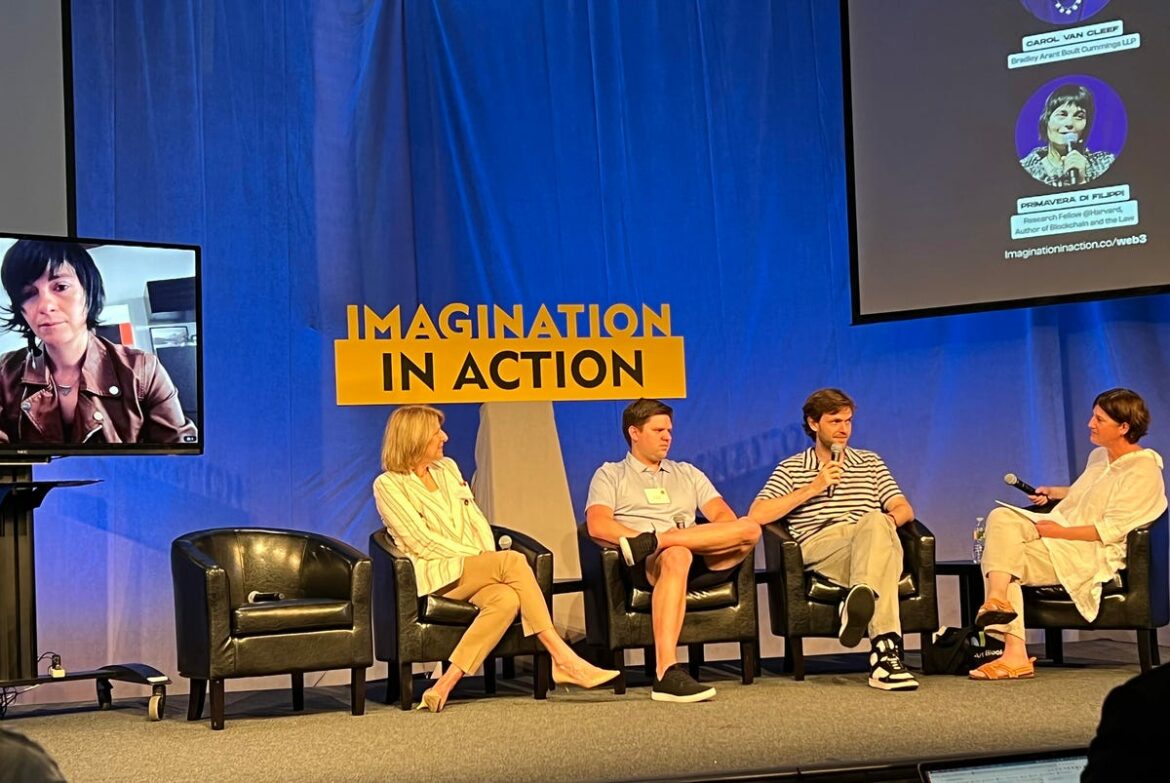NFT creators and legal scholars discussed NFTs ownership rights at the Imagination in Action Summit … [+]
On the heels of NFT.NYC’s 15,000 enthusiast, three-day event in Manhattan, a smaller gathering of top NFT, blockchain and crypto, movers and shakers converged in Cambridge at MIT’s Media Lab on June 30th for an intense day of panel discussions and networking at Imagination in Action Web3 Summit founded by managing partner of Link Ventures John Werner. Despite a generally enthusiastic mood, much of the NFT (non-fungible token) discussion centered around the intellectual property and copyrights and other issues facing an industry still in its infancy.
Though CEO and founder of Reach Chris Swenor believes that “nobody has actually provided the added value of blockchain yet,” he admitted NFTs’ power lies in the fact that they provide “self sovereign ownership with the ability to make your own rules,” during a panel on Web3 innovation.
NFTs are often associated with art works and profile picture collections (nicknamed PFPs). But panels covered a series of applications beyond the arts – gaming, entry into the metaverse and NFT uses in the sports sector.
The gaming industry, in particular, seems particularly poised for NFT adoption, albeit a bit reluctant. Gaming NFTs hit a total of $5.17 billion in 2021, according to a report by Nonfungible.com. Interactive and world-building games in Web2 have already created environments where users own and exchange tokens within the game. Combine this with Web 3 and blockchain technology and we’ve seen the rise to play-to-earn blockchain-based games.
“You’ve trained an entire generation to build and train in these virtual worlds. It’s kind of like the training wheels for the metaverse,” said co-founder of Animoca brands Yat Siu. Animoca hosts some of the most popular blockchain-based games including The Sandlot and REVV
In sports, NFTs were discussed as a larger tool for fan engagement. Major leagues, both in the United States and globally, have adopted the technology to bridge the gap between fans, teams, and players. The NBA’s Topshot collection is ranked as the top collectibles collection and has a volume worth over $951 million, according to DappRadar. The NHL, MLB, and NFL all have partnered with different marketplaces to create their own NFT collections while Formula One teams have launched limited edition NFTs with their respective crypto and blockchain sponsors.
“A passionate fan is a profitable fan,” said Todd Cooper, CEO and cofounder of NuArca Labs.
The large question of the panel centered on potential Web3-led team ownership structures. Integrating NFTs with DAOs, decentralized autonomous organizations, speakers were cautious about giving too much decision-making power to fans.
Moderator Khalid Jones jokingly pointed to “the cost of hilarity” as the main reason for limiting off-chain decisions to experts. “I think what we’ll see is something more like little ‘d,’ little ‘a, big ‘o,’’” he added, referring to a team structure that would feature partial decentralized ownership.
The main NFT panel, however, focused on the legal aspects of token ownership. Creators and legal scholars discussed the current rights NFT creators, owners, and marketplaces have.
“How do we actually encode the IP rights into the token?,” asked Primavera de Filippi, NFT artist and legal scholar. Currently, intellectual property rights vary from token to token and are not always clearly defined within smart contracts.
The question on legal ownership of digital assets is now front and center within the NFT world as YugaLabs, the creators of Bored Ape Yacht Club (BAYC), the largest NFT collection by floor cap (862,828 ETH
After YugaLabs’ acquisition of CryptoPunks and Meebits, other popular NFT collections, Yuga Labs grew to have an $8.1 billion market cap in March, according to Dapp Radar.
However this generous approach to NFT rights is not the norm. Other large NFT collections often stick to limiting ownership rights to licensing, if any explicitly at all. CryptoKitties and Doodle allows owners to commercialize their NFTs for merchandise, but caps earnings at $100,000 per year.
“Neither rights or no rights are inherently good or bad,” added NFT artist Nacho Gonzalez, pointing again to the ambiguity on what rights are transferred during NFT sales as a concern for the industry.

